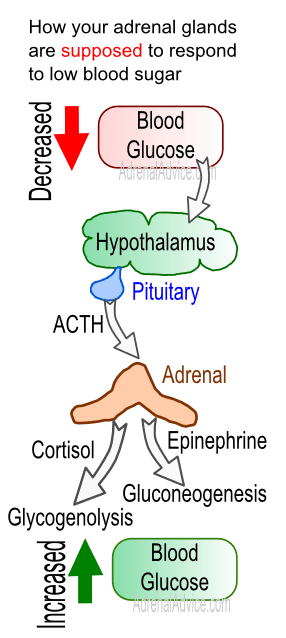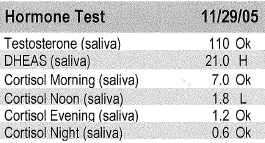Adrenal Fatigue and Hypoglycemia
- Hypoglycemia is a common adrenal fatigue symptom.
- It improves as people recover.
Some of your Adrenal Fatigue Symptoms
may be related to hypoglycemia.
Hypoglycemia occurs when blood sugar levels drop below normal levels.
Your adrenal glands play an important role in the control of blood sugar. Both Epinephrine (adrenaline) and cortisol are used to regulate blood glucose levels.
How common is hypoglycemia amongst those with adrenal fatigue?
The following table shows survey results of visitors to this site .... people researching adrenal fatigue.
| Question | Response |
# of People Responding |
| Do you get hypoglycemia ? (low energy that is relieved by eating) |
80.3% Yes |
73 |
| Morning Hypoglycemia ? |
43.5% Yes |
73 |
Afternoon Hypoglycemia ? |
71.8% Yes |
73 |
Evening Hypoglycemia ? |
39.3% Yes |
73 |
As you can see, hypoglycemia is a fairly common symptom, especially in the afternoon.
Hypoglycemia is actually listed as a symptom of Adrenal Insufficiency
1.
But Why? What is the connection between adrenal fatigue and hypoglycemia.
Your Adrenal Glands and Blood Sugar
- Adrenal hormones are needed to increase blood glucose (blood sugar)
Your adrenal glands respond to low blood sugar by increasing the production of adrenal hormones.
Hypoglycemia is combated by decreased release of insulin and increased secretion of glucagon, epinephrine, cortisol, and growth hormone7
Epinephrine is important for short term or acute control of blood sugar.
Cortisol is not used in acute maintenance of blood glucose. But it is important in the longer term control of glucose levels.

There are couple of ways that you can experience hypoglycemia.
One way is called fasting hypoglycemia
.
If you have not eaten a meal for a few hours, your blood sugar levels will start to drop. This is when your adrenal glands must respond.
If they can't respond sufficiently, you will likely experience symptoms of hypoglycemia.
If you have something to eat, and immediately feel better .... it was likely hypoglycemia.
Another type is called Postprandial hypoglycemia
(Reactive hypoglycemia). This occurs after you eat
foods that spike blood
sugar very quickly.
When you eat food with sugar or other high glycemic foods, your blood glucose increases quickly8.
To try to counter the fast rise in blood glucose, your insulin levels also rise quickly. Increased insulin causes blood glucose to be absorbed into the liver as glycogen.
The problem is that your body can over-correct to high blood sugar by producing too much insulin.
The excess insulin drops blood sugar too much, and those with adrenal fatigue can't produce enough epinephrine to counter the excess insulin.
So you are more prone to the sugar crash
type of hypoglycemia (reactive hypoglycemia.
The Afternoon Energy Crash
The survey results at the top of the page show that most common time people with adrenal fatigue experience hypoglycemia symptoms is in the afternoon.

Figure 1. Sample Saliva Test
For those that have taken a saliva adrenal fatigue test, they often find that they have low cortisol in the afternoon or evening.
Figure 1 shows a sample saliva test. Note the low cortisol at noon.
Some people have different saliva test results. But Figure 1 results are common.
This may explain why hypoglycemia is often worse in the afternoon. The adrenal glands seem more prone to running out of gas in the afternoon, so they would be less able to respond to a drop blood sugar.
Symptoms of Hypoglycemia
Hypoglycemia may be responsible for some of your adrenal fatigue symptoms.
Below is a list of potential hypoglycemia symptoms. People that participate on various adrenal fatigue forums complain about having these symptoms.
- Headache
- Excessive sweating
- Blurred vision, Double Vision
- Dizziness
- Flashes of light in the field of vision
- Trembling, lack of coordination
- Numb hands or feet
- Depression, anxiety
- Mental confusion, irritability
- Heart palpitations
- Slurred speech
- Shakiness
- Fatigue
Keep in mind that some of these can have multiple causes. For example, subconscious hyperventilation (also common from chronic stress), can result in blurred vision and flashes of light.
Managing Hypoglycemia from Adrenal Fatigue
- Eat small frequent meals
- Avoid simple carbohydrates
- Include food with fat/protein with your meals.
First, avoid foods that will cause the sugar crash
, or reactive hypoglycemia, especially if
eaten by themselves. Foods to avoid eating by themselves will rank high on the
Glycemic Index scale.
Don't go too long in between meals. Eat soon after waking. This will help you avoid fasting hypoglycemia.
I have seen people on adrenal fatigue forums that needed to eat every 2 hours in order to avoid an energy crash from hypoglycemia.
When you do eat carbohydrates, chose complex carbs, and combine them with fat and protein. This will also help reduce reactive hypoglycemia (sugar crash).
Summary
Hypoglycemia is a fairly common adrenal fatigue symptom. ... and it results in many more symptoms.
It does get better as people begin to recover. Mine is completely gone now. And I have seen many other people on adrenal fatigue forums that have eliminated their hypoglycemia.
I wish you all the best. Good luck.
References
1. Adrenal Insufficiency and Addison's Disease2. Hypoglycemia (Medline Plus)
3. Hypoglycemia (Wikipedia)
4. Hypoglycemia (University of Maryland Medical Center)
5. Cortisol
6. Glycogenesis
7. Lippincotts Illustrated Reviews: Biochemistry
8. Glycemic Index
9. Sugar Crash

